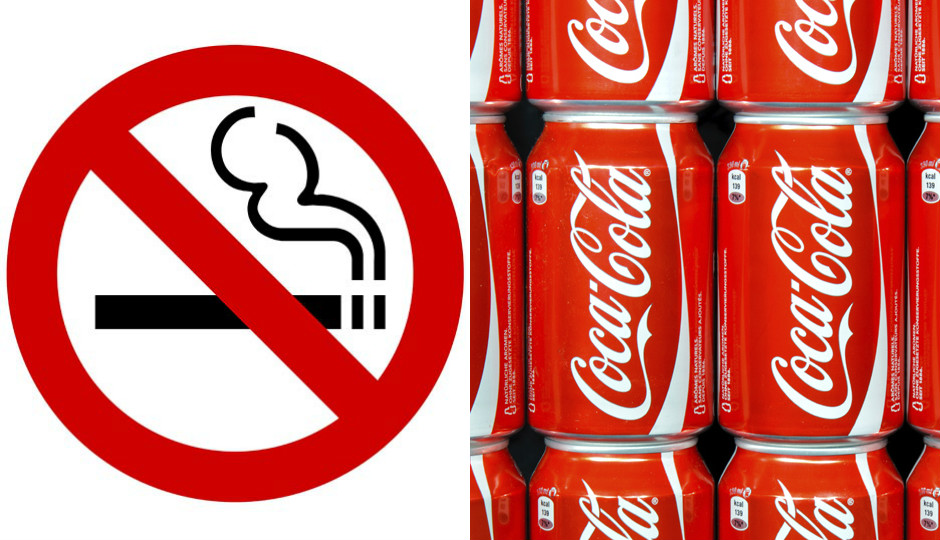Will Philly’s Soda Tax Make Coca-Cola the Next Philip Morris?

Images via iStock.com
In 1973, Arizona became the first state in America to restrict smoking in some public places. Four years later, Berkeley, Calif., became the first city in the nation to limit smoking in restaurants and other public places. Soon thereafter, the state of California, San Francisco and New York City enacted their own smoking bans. Fast-forward to today: Thirty states and 812 municipalities have smoke-free laws on the books.
A few decades from now, will we look back and remember Philadelphia as the city that paved the way for governments across the country to tax soda, much like Arizona and Berkeley did for smoking bans?
That’s what some sugary drinks tax advocates predict, and they make a pretty convincing case.
On Wednesday night, a Philadelphia City Council committee preliminarily approved a 1.5-cent-per-ounce tax on sugary drinks and diet sodas in order to fund Mayor Jim Kenney’s budget initiatives: expanded pre-K, community schools, refurbished parks and other programs. If Council passes the legislation next week, as expected, Philly will become the second city in the nation to approve a soda tax. Notably, the anti-smoking pioneer Berkeley was the first city to create a tax on sugary drinks; voters approved a levy there in 2014.
Kelly Brownell, the dean of the Sanford School of Public Policy at Duke University, studies and supports soda taxes. He says they’ve gotten off to a similar start as anti-smoking legislation did. First, government was A-OK with tobacco, just as it was fine with sugary drinks; then, as public opinion changed, officials moved to ostracize the product. The first federal excise tax on tobacco was enacted during the Civil War; Iowa was home to the first state-level cigarette tax in 1921. By 1969, all 50 states had such taxes.
“The trajectory is very similar. The first victories were in small towns and cities, mainly in California, and then they begin to spread to others and towns and cities, and then states and larger cities began considering them. Then the momentum had been established and the companies couldn’t fight them off,” he says. “With Berkeley being the first place and Philadelphia likely being the second to pass a soda tax, I expect the momentum will quickly be established and many other places will begin issuing them.”
In fact, he thinks even the federal government will pass its own soda tax someday.
Dr. Jim Krieger is the executive director of Healthy Food America and a supporter of soda taxes. He agrees that a tax on sugary drinks in Philadelphia could create a domino effect. “Taxes on sugary drinks can be an important source of revenue for local communities and states that have not fully recovered from the Great Recession,” he says. “I think that, for other jurisdictions that have their own list of things that they want to support, this will be a good precedent.”
Brownell and Krieger also believe that big-soda bans will likely spread throughout the country in the future. Former New York City Mayor Michael Bloomberg’s ban was struck down by that state’s highest court in 2014.
Larry Ceisler, a spokesman for the soda industry-funded group No Philly Grocery Tax, argues that “what is happening in Philadelphia cannot necessarily be replicated nationally.” He says that the Philadelphia political system is peculiar, and that the soda tax was preliminarily approved partly due to unique alliances and power struggles here. “You also had a mayor who was just elected, so he’s in a honeymoon period,” he says.
It’s true that Mayor Kenney has only been in office for five months. But other executives around the country will have honeymoons that they can exploit to their political advantage, and every legislative body passes bills partly thanks to relationships. Plus, it’s easy to imagine other cash-strapped cities looking to Philadelphia, seeing that it is funding populist programs like expanded pre-K and upgraded parks with a soda tax, and wanting to do the same. (A federal tax on sugary drinks, on the other hand, would have little chance of passing as long as Republicans remain in control of Congress. The November election could flip the Senate, but a similar switcheroo in the House is unlikely.)
The soda industry clearly understands the risks. The American Beverage Association, a soda industry group, has spent at least $45 million in recent years to lobby against soda taxes, which it says are regressive and unsustainable. Until now, those expensive efforts have largely succeeded: The organization says it has fended off proposed sugary drinks taxes 45 times in cities and states throughout the country (including twice in Philadelphia, when former Mayor Michael Nutter pushed for them).
Local beverage-bottling mogul Harold Honickman has led the battle against the soda tax in Philadelphia, and he and his wife have donated hundreds of thousands of dollars to local political campaigns in the last few years. I recently asked him why he fought as hard as he did against the tax. Was it to keep it from spreading to other cities, or even to the federal government? “I think there’s some merit to that,” he told me.
In 1994, Brownell says, the New York Times published an op-ed he wrote advocating for taxes on certain food and drinks. “People thought the idea was crazy and government would never do anything like this, and here we are now,” he says. “I think the action in Philadelphia was both heroic and historic, and when the history of this is written, people will look to Philadelphia as being in the forefront.”
Follow @HollyOtterbein on Twitter.